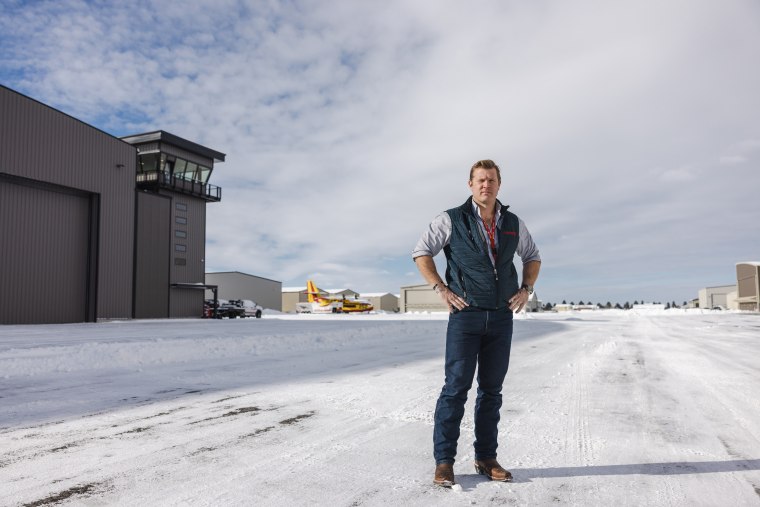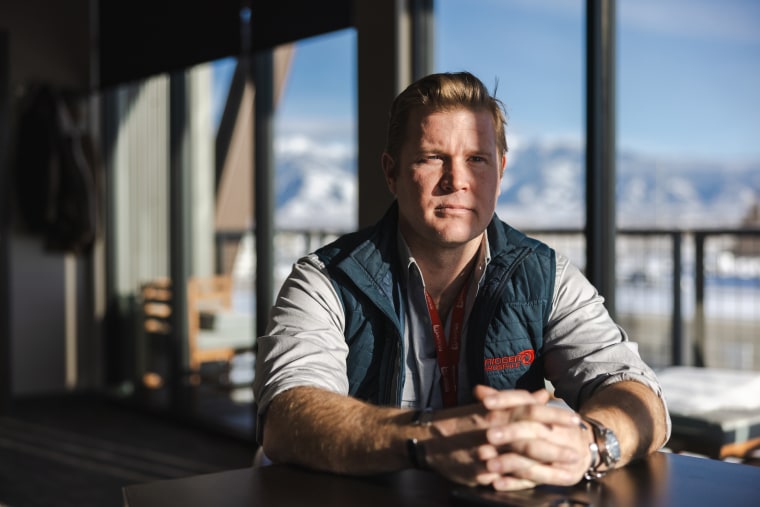As they navigate a tough 2024 map to maintain their slim Senate majority, Democrats are attempting to frame a key race in Montana around issues with unique resonance in the state: authenticity and access to public land.
They emphasize the dirt farm roots of the incumbent, Sen. Jon Tester. By contrast, they portray likely Republican challenger Tim Sheehy as a “rhinestone cowboy” who only dons a big hat when posing for pictures on social media.
Sheehy, an ex-Navy SEAL and Minnesota native, holds up his Little Belt Cattle Co., founded in 2020 in central Montana, as a success amid profound challenges in agriculture. Democrats hope voters will instead view it as a threat in a state settled and developed through federal homesteading programs dating back to the 1800s.
More recently, Montana has seen a rush of deep-pocketed outsiders buying up land. Democrats are trying to tie Sheehy to the trend — another outsider eager to capitalize on how the popular television series “Yellowstone” has romanticized Mountain West living. Little Belt, which raises and sells cattle and beef, encompasses land once divided among three smaller ranches in prime elk-hunting country. It only allows private hunting on its grounds.
“Super wealthy folks are buying huge tracts of land and turning Montana and other Western states into a playground for the rich,” Noah Marion, political and state policy director for Wild Montana Action Fund, a group that plans to support Tester this year but in the past has also backed Republicans and independents, told NBC News.
Tester, along with Sen. Sherrod Brown of Ohio, is one of two highly vulnerable Democrats seeking re-election this year in a state former President Donald Trump won twice. Democrats nationally and in Montana have for months attempted to poke holes in Sheehy’s biography, scrutinizing his military service and business interests.
“With Tim Sheehy in charge, we can kiss our public lands goodbye,” Montana Democratic Party executive director Sheila Hogan said. “When he sees Montana’s wild-open spaces, all he sees is a way to make a quick buck from wealthy vacationers and out-of-staters like him.”
Campaign spokesperson Jack O’Brien countered that Sheehy is committed to preserving and expanding access to public lands while listening “to the voices of local communities” when determining land policy.
“Those attacks against a veteran-owned and operated cattle operation are ridiculous,” O’Brien added. “Tim is proud of the Little Belt Cattle Co., the team, and the work they do to preserve our ranching heritage in Montana.”
The public lands debate transcends politics. In the University of Montana’s recent 2024 Voter Survey on Public Land, 47% of voters described “clean water, clean air, open spaces and public lands” as “very important” and “a primary factor” when deciding which candidates to support. Another 36% said these concerns are among several that will factor into their vote.
“There is a constituency here of outdoorsmen ... and they tend to be a little bit more blue-collar, they tend to be a little bit more conservative,” said Chuck Denowh, a lobbyist with close ties to top Montana Republicans and the executive director for United Property Owners of Montana, a right-leaning advocacy group. “So they’re kind of in that camp that would-be leaning Republican, but they can be influenced on these outdoors issues. It’s page one of the playbook for Democratic candidates to try to create a controversy.”
A debate over ‘Montana values’
Democrats used the playbook against Republican Greg Gianforte in his unsuccessful 2016 campaign for governor and again in 2020, when he won the job. They also deployed it in 2018 against Tester’s GOP challenger, Matt Rosendale, highlighting his past support for transferring federally owned land to the state. Many fear such a move would eventually force the state to sell off property to cover increased maintenance costs.
The attacks have been recycled this year for Sheehy, whom Democrats have branded “Transplant Tim.”
“Montana Democrats roll out this tired line of attack every election to falsely accuse Montana Republicans of not supporting public lands, but voters see it as nothing more than crying wolf and shameless scare tactics at this point,” said Sen. Steve Daines, a Montana Republican who chairs the Senate GOP’s campaign arm.
But Gianforte, Rosendale and Sheehy have something else in common: They all grew up and lived elsewhere before moving to Montana later in life and entering politics.
“Outside of Tester, almost everyone else who represents us on the national stage or who even has run for statewide office recently is not a born and bred Montanan,” said Alex Leone, executive director of the Public Land Water Access Association, a nonpartisan advocacy group. “The people that moved here try to claim they have Montana values, but they don’t.”

Sheehy has lived in Montana since 2014 and has talked about how he and his wife, Carmen, a former Marine, decided to settle there after leaving military service.
“We were avid outdoorspeople and loved to hike, camp and ski,” he wrote in “Mudslingers,” a memoir focused on his Montana-based aerial firefighting company. “We knew the region well, loved it, and became somewhat obsessed with the idea of settling there and raising a family. It seemed like a place that was consistent with our values and the way we wanted to live.”
Sheehy and Greg Putnam, a fellow former Navy SEAL, co-founded Little Belt four years ago. In 2021, Sheehy won a conservation award from the nonprofit Montana Land Reliance for working to ensure the ranch “will remain scenic and open space in perpetuity.” Little Belt surrounds a piece of federally owned land and borders other public grounds, property records show.
Putnam, who runs day-to-day operations, said Little Belt manages an in-state supply chain that supports its wholesale beef program. He and Sheehy talk of building an enterprise that will pass down to their children and help reverse the decline of family farms passing down to future generations.
“For our industry to remain sustainable and continue to provide a safe, secure food supply for our nation, we need beginning or first-time ranchers entering the ranching industry to replace those retiring,” Raylee Honeycutt, executive vice president of the Montana Stockgrowers Association, said in a statement provided by Sheehy’s campaign.
Side hustle draws skepticism
Little Belt had been enjoying a run of good publicity in its first years, Putnam said.
“Basically right up until the day Tim decided to run for Senate,” he added. “Then all of a sudden … obviously, there’s been far more negative.”
A smaller piece of Sheehy’s business model — something Putnam characterized as more of a side hustle or “secondary revenue stream” for Little Belt — has fueled the criticism. Little Belt contracts with a private outfitter to offer paid hunting excursions. The ranch was also previously listed on LandTrust.com, a site that is to outdoors enthusiasts what Airbnb is to vacation planners.
In a state with deep homesteading roots where some still believe all land is public land, privatization is a flashpoint.
“Pay-hunting is kind of gross,” said Matt Rinella, a research ecologist and founder of Hunt Quietly, a group that opposes the “hyper-commercialization” of hunting and recreation. “I have ‘Trespassing Allowed’ signs on my property, just to give you a sense of how important this stuff is to me.”
Little Belt has advertised its proximity to public land as a selling point. A 2022 listing on LandTrust boasted of “private access to over 500,000 acres of National Forest.” The listing promised a “premier destination for hunters or folks just seeking a taste of the hard work, commitment and care that characterizes life on the ranch” and “all the comforts of a first-class vacation.”
At one point in 2022, Little Belt offered LandTrust’s “most spendy package currently available in Montana” — “a 5-day, 5-person archery hunt … which runs $12,500,” according to the Montana Free Press.
Little Belt ended its relationship with LandTrust after one season, after it became too much of a hassle for a working cattle ranch, Putnam said. Little Belt also does not participate in Block Management, a program run by the Montana Department of Fish, Wildlife and Parks that works with private landowners to provide free hunting access. The ranch does not allow the public to hunt on its private property.
“In general, no,” Putnam said. “Like, if somebody knocked on the door and didn’t go through that outfitter that we have that exclusive agreement with, then we typically don’t.”
Little Belt does not block public access points to the surrounding public grounds, including a nearby county road, Putnam added.
A swath of private property surrounding or bordering public land can be an inconvenience for hunters who might have to walk or drive farther to access a public spot. But allowing those hunters on private property can be an inconvenience to landowners, said Denowh, the head of the property owners group.
“It’s easy to spread noxious weeds when you have people dragging through your property or they’re going from one property to the next,” Denowh added. “There’s some liability issues, too. You’ve got people out there with firearms, crawling over barbed wire fences, hiking.”
Others wonder if Sheehy’s ranch runs counter to Montana tradition.
“People who can’t pay $12,000 a head are losing access to these special places,” said Marion, of the Wild Montana Action Fund. “And they’re left with fewer places to go and fewer animals to hunt on public lands.”
Sheehy’s role promoting the ranch has also drawn scrutiny, particularly the social media posts that chronicle Little Belt’s work and feature the candidate neatly attired in ranchwear. One Facebook post from 2021 shows Sheehy clad in a cowboy hat while holding a Coors Banquet, the official beer of the “Yellowstone” TV series, which tells the story of a fictional ranch-owning family in Montana.
Last Best Place PAC, a group affiliated with Democratic Senate Majority Leader Chuck Schumer’s Senate Majority PAC, has dedicated a website to mocking Sheehy for merchandising Little Belt apparel, including hooded sweatshirts and trucker hats.
Democrats also have circulated a Vanity Fair article that described Sheehy as the latest Montana politician “to contrive a cowboy aesthetic” and have ridiculed the ranch’s heavily hashtagged presence — #yellowstone, #cowboys — on social media.
Little Belt supporters described these as efforts to grow awareness of and raise money to support a first-generation ranch while tapping into an increasing interest in Mountain West culture. But others remain skeptical of Sheehy’s involvement.
“He’s not a rancher — he’s a dude rancher,” Chris Marchion, a Tester supporter who sits on the Montana Wildlife Federation’s board of directors, said, using a term for out-of-state tourists who visit Montana.
Daines, who recruited Sheehy to run, rejected those characterizations.
“Little Belt Cattle Co. is a veteran-run business that built a locally sustainable supply chain of 100% Montana beef,” Daines said. “That’s something to be celebrated, not attacked.”

